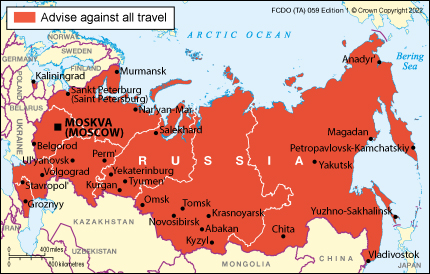Russia
Summary

The Foreign, Commonwealth & Development Office (FCDO) advises against all travel to the whole of Russia due to the lack of available flight options to return to the UK, and the increased volatility in the Russian economy.
If your presence in Russia is not essential, we strongly advise that you consider leaving by remaining commercial routes.
Border crossings and airports have been particularly busy since 21 September 2022. Allow extra time if you are travelling.
Political rallies and demonstrations can occur in Moscow, St Petersburg and other places across Russia. Check the local media for the latest information, be vigilant, and avoid any any demonstrations. See Political situation
On 24 February 2022 Russia launched a large scale invasion of Ukraine which is ongoing. International and domestic response to this action is affecting conditions within Russia and for those traveling to Russia in a number of ways.
On 21 September, Russia declared a “partial” mobilisation of Russian citizens to join the military forces. British nationals holding Russian passports should be aware that they may be in scope for mobilisation, as the Russian government treats dual nationals with both British and Russian passports as Russian nationals.
On 24 February the Russian authorities announced restrictions on domestic flights to a number of airports in southern Russia, with disruption to internal flights to and from Moscow and other cities. Currently Anapa, Belgorod, Bryansk, Voronezh, Gelendzhik, Krasnodar, Kursk, Lipetsk, Rostov-on-don, Simferopol and Elista are affected. Check the latest information with your airline or travel provider. The Russian aviation authorities have published information about the affected airports (in Russian). See Safety and security and Travel in Russia.
On 4 March 2022, the Russian parliament passed laws imposing severe restrictions on the publishing and distribution of information related to the Russian armed forces and any military operations. See IT and Social Media page.
There have been numerous reports of explosions and fires in areas near the Russian border with Ukraine. The wider situation remains unpredictable and could further escalate without warning.
If you are in Russia, it will not be possible to fly directly to the UK, or via EU countries. Check the latest information with your airline or travel provider. Connecting flights, largely via the Middle East, Serbia and Turkey are operational for travel from Russia to the UK and other destinations.
See our returning to the UK information about leaving via the Baltic States using bus services to leave Russia.
There have been multiple reports of intensive security checks on foreign nationals at Russian border crossings upon entry/exit. Travellers may be subject to the detailed questioning, taking of fingerprints and DNA swab tests, and requests to switch on electronic devises for content checking.
British nationals in need of consular assistance should call the British Embassy in Moscow and then select the option for consular assistance +7 (8) 495 956 7200. Phone lines are answered 24hrs a day. You can contact the emergency services by calling 112.
The value of the Rouble is currently volatile and the value of holdings of Roubles may fluctuate.
The UK government has imposed sanctions against a range of Russian companies and individuals and imposed other finance, trade and transport sanctions in relation to Russia. These sanctions may impact on transactions in, or connected with, Russia. More information about Russia sanctions is available on GOV.UK, including on the application of sanctions prohibitions and requirements to British nationals.
In May 2022, the UK government designated Aeroflot, Rossiya Airlines, Ural Airlines and Russian Railways for the purposes of UK sanctions. This means that British nationals and others who are bound by UK sanctions are prohibited from entering into transactions which result in making funds directly or indirectly available to these companies, such as purchasing tickets from them. On 23 May 2022, the Office for Financial Sanctions Implementation issued a general licence which means that for journeys originating in, or within, Russia, British nationals may purchase tickets from these companies without breaching UK sanctions.
MasterCard and Visa have suspended operations in Russia. This means that MasterCard and Visa cards issued outside of Russia will not work at Russian merchants or ATMs. Cards issued inside Russia continue to work in Russia but they will not work outside of Russia. You should be aware that it may not be possible for you to access your funds through Russian banks or to make payments to Russian businesses with non-Russian credit/debit cards.
There are reports of increased police presence and ID checks. You should keep your passport with you at all times. See Safety and security
If you decide to remain in Russia, keep your departure plans under constant review and ensure your travel documents are up to date. You should monitor the media and this travel advice regularly and subscribe to email alerts.
Consular support is severely limited in parts of Russia due to the security situation and the size of the country. The North Caucasus remains an unstable and potentially dangerous region. The Russian authorities take a particularly strict attitude towards security, as well as compliance with visa and registration rules.
Short-term travel restrictions are sometimes applied in relation to ongoing security operations. These are publicised at very short notice, if at all. See Local travel
It is more important than ever to get travel insurance and check it provides sufficient cover. See the FCDO’s guidance on foreign travel insurance.
Terrorists are very likely to try to carry out attacks in Russia. See Terrorism.
The UK doesn’t recognise Crimea as being part of Russia. See the Ukraine travel advice page for details.
According to the Federal Agency for Statistics, British nationals made around 19,370 visits to Russia in 2021. Most visits have been trouble-free.
Small earth tremors are recorded throughout the year without consequences. To learn more about what to do before, during and after an earthquake, see the website of the US Federal Emergency Management Agency.